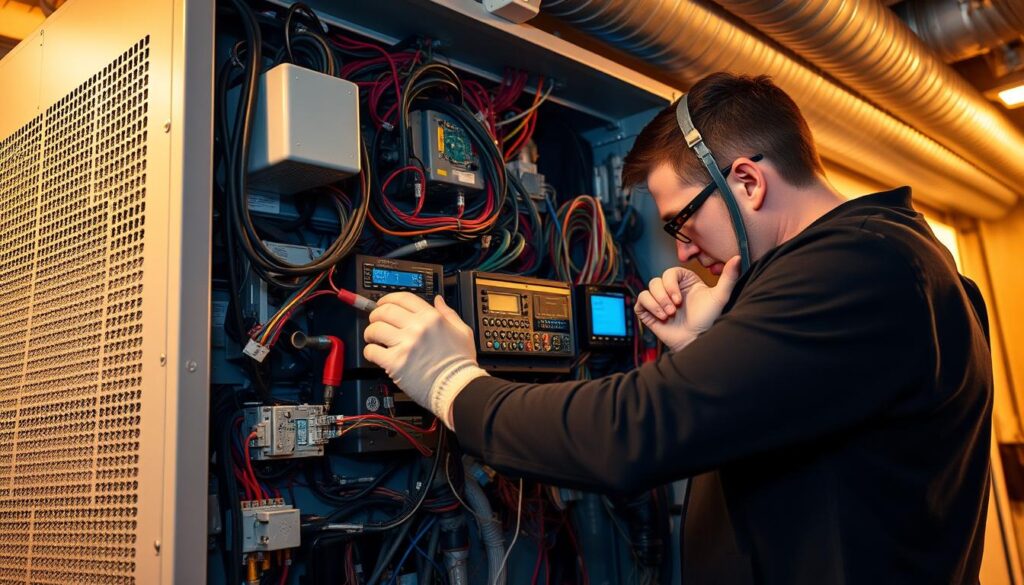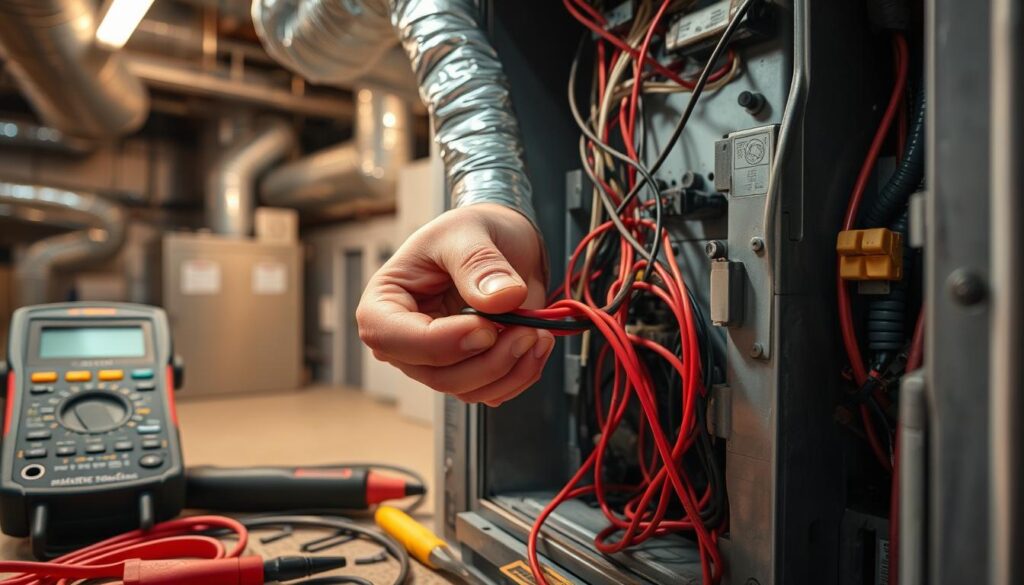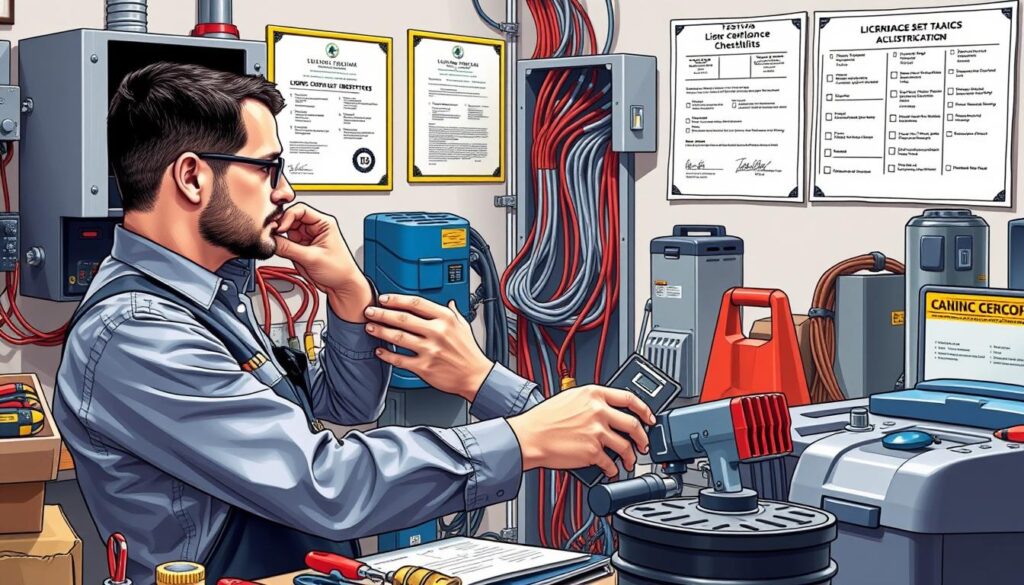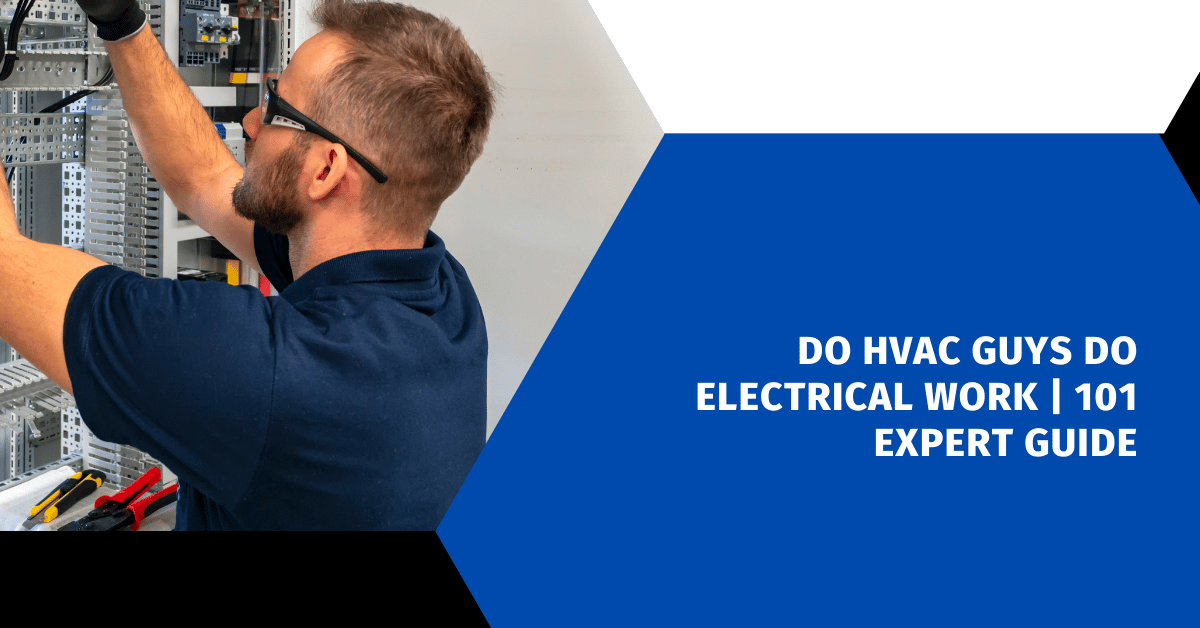Affiliate Disclosure
HVAC Guide Guys is a participant in the Amazon Services LLC Associates Program, an affiliate advertising program designed to provide a means for sites to earn advertising fees by advertising and linking to Amazon.
Do HVAC Guys Do Electrical Work? It might surprise you, but HVAC technicians often do electrical work too. In fact, over 70% of them handle electrical tasks every day. This is because modern HVAC systems are getting more complex. Also, there’s a shortage of electricians who can do HVAC installations.
HVAC technicians aren’t electricians by training. But, they know a lot about electrical systems. They can fix control circuits and even rewire parts. This makes them key players in the home services world, ready to meet customer needs.

Key Takeaways
- HVAC technicians often perform electrical work as part of their job duties, with over 70% handling various electrical tasks regularly.
- The blurring of the lines between HVAC and electrical work is driven by the increasing complexity of modern HVAC systems and a shortage of qualified electricians.
- HVAC technicians are well-equipped to handle a wide range of electrical tasks related to HVAC equipment, from troubleshooting control circuits to rewiring components.
- HVAC technicians have become indispensable members of the home services industry, expanding their skillsets to meet the evolving needs of their customers.
- Proper training, certification, and understanding of electrical systems are crucial for HVAC technicians to safely and effectively handle electrical work.
Table of Contents
Understanding the Overlap Between HVAC and Electrical Work
HVAC technicians often have skills that include basic electrical knowledge. This is key for modern HVAC systems to work right. Let’s look at the main areas where HVAC pros need to know electrical stuff.
Basic Electrical Knowledge Requirements
HVAC techs need to know electrical basics to work on HVAC gear. They should understand circuits, voltage, current, and safety rules. Knowing about low-voltage systems, like thermostats, is also crucial.
Common Electrical Tasks in HVAC
- Wiring controls, including thermostats, switches, and relays
- Troubleshooting and repairing electrical parts, like motors and transformers
- Checking electrical connections and making sure they’re grounded
- Fixing electrical problems that mess with HVAC system performance
Safety Considerations
When dealing with electrical in HVAC, safety is top priority. HVAC techs must follow safety rules and best practices. This includes wearing PPE, using lockout-tagout, and knowing about electrical dangers.
Having HVAC electrical knowledge helps techs keep HVAC systems running well. This skill is very important in the field and can open up more job chances for HVAC pros.
Explore Our HVAC Shop
Looking for top-rated HVAC tools, parts, and accessories? Visit our shop and find the perfect solution for your needs.
Visit the ShopDo HVAC Guys Do Electrical Work: Scope and Limitations
At the crossroads of HVAC electrical scope and HVAC technician limitations, it’s key to grasp the limits. HVAC techs, though not licensed electricians, handle certain electrical tasks tied to HVAC systems. They grasp the refrigerant cycle, solve electrical problems, and upkeep the electrical parts of HVAC systems.
Yet, HVAC techs can’t tackle big electrical jobs. They can’t rewire a whole building or make big changes to the electrical setup. That’s the job of a licensed electrician.
HVAC techs need to know a lot about electricity to keep HVAC systems safe and working right. They check fuses, test wires, and make sure connections and grounding are correct.
| HVAC Electrical Scope | HVAC Technician Limitations |
|---|---|
|
|
It’s vital for homeowners and businesses to know what HVAC techs can and can’t do with electrical work. HVAC techs are great at fixing and keeping HVAC systems running, but they’re not ready for complex or risky electrical tasks. If you need such work, it’s best to call a licensed electrician for safety and to follow the law.
Explore Our HVAC Shop
Looking for top-rated HVAC tools, parts, and accessories? Visit our shop and find the perfect solution for your needs.
Visit the ShopThe Essential Skills of HVAC Electrical Contractors
Being an HVAC electrical contractor means more than just basic mechanical skills. You need a mix of electrical knowledge and troubleshooting skills. Knowing control systems, system integration, and how to troubleshoot are key.
Control System Expertise
HVAC systems use complex control systems to work well and efficiently. You must understand these systems well. This includes knowing about relays, contactors, and motor controls, and how they fit together in HVAC setups.
Troubleshooting Capabilities
When HVAC systems go wrong, you need to find and fix electrical problems fast. Good troubleshooting skills are crucial. This means knowing how to read electrical diagrams, test circuits, and find problems.
System Integration Knowledge
HVAC systems have many parts that work together. You need to know how these parts interact. This helps you keep systems running smoothly, find problems early, and do maintenance to prevent issues.
Having skills in control systems, troubleshooting, and system integration is key. These skills help you offer reliable services. You can make sure HVAC systems work their best for your clients.
“The best HVAC technicians are the ones who are constantly learning and adapting to new technologies. It’s not just about the technical skills – you need to have a genuine curiosity and willingness to stay on top of the latest developments in the industry.”
– John Doe, Master HVAC Technician with 25 years of experience
Electrical Requirements for Modern HVAC Systems
HVAC systems are getting more complex, and their electrical needs are too. Knowing the HVAC electrical requirements is key for safe and proper system operation.
The National Electrical Code (NEC) Article 440 is crucial for modern HVAC systems. It details the electrical parts and wiring needed. HVAC techs must know Article 440 well to size wires and breakers right.
HVAC techs also need to know about single-phase and three-phase electrical services. The right electrical service depends on the HVAC system’s size and power needs.
| HVAC Electrical System Requirements | Voltage |
|---|---|
| Central Air Conditioning | 208/240 volts |
| Window AC Units | 110/120 volts |
| Mini Split Air Conditioners | 208/240 volts |
Older homes might only have 100-amp service, which is too low for today’s HVAC electrical requirements. Often, upgrading to 200-amp or more is needed for modern HVAC systems.
An electrical check before installing HVAC can spot needed upgrades. This check makes sure the power is enough and the electrical system works well with the HVAC.
Understanding the electrical needs of modern HVAC systems is vital for HVAC techs. It ensures their work is safe, efficient, and meets standards. This knowledge helps provide top-notch HVAC services to homes and businesses.
Explore Our HVAC Shop
Looking for top-rated HVAC tools, parts, and accessories? Visit our shop and find the perfect solution for your needs.
Visit the ShopTransitioning from Electrician to HVAC Technician
If you’re an electrician thinking about switching to HVAC, there are important steps to take. HVAC work often includes electrical parts, so your current skills are a great starting point.
Required Certifications
Getting the EPA 608 certification is key for HVAC techs. It lets you work with refrigerants legally. Also, the NATE certification shows you know a lot about HVAC.
Training and Education Paths
- Trade schools and tech colleges have HVAC programs that last 6-12 months.
- Learning on the job with an HVAC company is another good choice. You get hands-on experience and get paid.
- Some electricians get an associate’s degree in HVAC tech to boost their skills.
Career Advancement Opportunities
As an HVAC tech, you can specialize in areas like refrigeration or solar systems. These jobs often pay more and come with more duties. Your electrical background can also help you tackle complex HVAC tasks.
Switching to HVAC from being an electrician can be very rewarding. You get to use your current skills and learn more in a field that’s always in demand. With the right certifications and training, you’re set for success in HVAC.
HVAC Electrical Services and Maintenance
As an HVAC technician, you are key to keeping electrical parts of heating, ventilation, and air conditioning (HVAC) systems working well. Your skills in HVAC electrical services cover installing, fixing, and keeping electrical parts that power these systems.
Regular HVAC maintenance is vital for keeping systems efficient and lasting longer. You understand both electrical and mechanical parts of HVAC systems. This lets you offer full services that meet each system’s specific needs. Your skills in fixing control systems and adding new tech are crucial for keeping systems running smoothly.
- HVAC technicians make an average of $48,630 annually, according to the Bureau of Labor Statistics (BLS).
- The HVAC industry offers competitive salaries and stable employment, with a constant demand for skilled technicians.
- Proper HVAC electrical installation and maintenance can lead to significant energy savings, reducing utility bills and carbon footprint.
As an HVAC electrical expert, you are essential for keeping buildings comfortable, safe, and efficient. By keeping up with new tech and best practices, you can give top-notch HVAC electrical services. This makes your customers happy and keeps their systems in great shape.

“Proper electrical wiring and HVAC maintenance can extend the lifespan of these systems, leading to long-term savings for property owners.”
Explore Our HVAC Shop
Looking for top-rated HVAC tools, parts, and accessories? Visit our shop and find the perfect solution for your needs.
Visit the ShopCommon HVAC Electrical Problems and Solutions
As an HVAC technician, you’ll face many electrical issues. These can harm the performance and efficiency of HVAC systems. It’s key to know the common problems, how to diagnose them, and how to fix them. This knowledge helps you solve problems for your clients.
Diagnostic Procedures
Diagnosing electrical problems in HVAC systems needs special tools and knowledge. You’ll use multimeters and ammeters, and understand wiring diagrams. By checking the electrical parts, you can find the problem and plan the fix.
Repair Techniques
After finding the problem, you might need to replace parts or rewire. This could mean fixing or swapping out faulty parts. Sometimes, you’ll need a licensed electrician for safety and to follow rules.
Preventive Maintenance
Preventive maintenance helps avoid electrical problems. It includes cleaning connections, checking controls, and watching motor performance. This keeps HVAC systems running well for a long time.
| Common HVAC Electrical Problems | Diagnostic Procedures | Repair Techniques | Preventive Maintenance |
|---|---|---|---|
|
|
|
|
“Proper diagnosis and repair of HVAC electrical issues are essential for maintaining the comfort, efficiency, and safety of your clients’ systems.”
Legal and Licensing Requirements for HVAC Electrical Work
As an HVAC technician, knowing the legal and licensing rules for electrical work is key. HVAC contractors must follow both local and national electrical work regulations. This ensures they stay compliant and avoid legal trouble.
The rules for HVAC licensing change a lot from state to state. In some places, HVAC techs need extra licenses for electrical and plumbing work. For example, Indiana lets local areas decide their own rules, not the state.
Let’s look at a few examples of HVAC licensing rules:
- In Alabama, HVAC contractors need 3,000 hours (18 months) of experience to take the exam.
- Alaska has different HVAC categories under the Mechanical Administrator license. Each has its own needs, like journeyman experience or engineering registration.
- California requires HVAC contractors to have a $25,000 bond and insurance for jobs over $500.
- Florida HVAC contractors must pass a trade and business exam. They can work on different project sizes based on their license.
HVAC pros also need various certifications, like the EPA Section 608 card. This is to follow the law. Knowing these rules helps HVAC techs work safely and well in electrical tasks.

Explore Our HVAC Shop
Looking for top-rated HVAC tools, parts, and accessories? Visit our shop and find the perfect solution for your needs.
Visit the ShopUnderstanding Controls and Wiring in HVAC Systems
HVAC systems need a complex network of electrical controls and wiring to work well. It’s key for technicians to know how these systems work. Each part, like thermostats and timers, helps keep buildings at the right temperature and air quality.
Technicians must understand electrical diagrams to fix HVAC systems. This skill helps them find and fix problems with electrical circuits. They learn how to work with different electrical parts in HVAC systems.
Electrical Components in HVAC Systems
HVAC systems have many electrical parts, including:
- Thermostats: They control the temperature by turning heating and cooling on and off.
- Pressure switches: These check the pressure of refrigerant or air to make sure the system works right.
- Timers: They make HVAC equipment turn on and off automatically.
- Relays: These switch electrical circuits to control different parts of the HVAC system.
- Capacitors: They store and release energy to power motors and compressors.
- Transformers: These change high-voltage electricity to low-voltage for control circuits.
Knowing how these parts work and connect is vital for HVAC technicians. It helps them find and fix problems in the system.
Wiring Considerations in HVAC Systems
HVAC wiring systems are complex, with both low-voltage and line-voltage circuits. Technicians need to be good at reading wiring diagrams and schematics. This is important for installing, maintaining, and fixing these systems safely.
| HVAC Electrical Component | Voltage Range |
|---|---|
| Thermostats, control boards, sensors | 24 volts (low-voltage) |
| Blower motors, compressors, contactors | 120-240 volts (line-voltage) |
Understanding HVAC controls and wiring is a key skill for technicians. With this knowledge, they can fix and keep HVAC systems running well. This ensures buildings are comfortable and energy-efficient for their clients.
Conclusion
HVAC technicians have a lot of electrical knowledge. They work with complex electrical systems and controls. To do well in the HVAC field, it’s important to keep learning and know the latest trends.
The mix of HVAC and electrical work offers great chances for those who know both well. By knowing the electrical parts of HVAC systems, you can fix problems better. You can also integrate systems more smoothly and offer better services to clients.
Getting extra certifications, like the EPA 608 for refrigerants, can boost your skills. This makes you more appealing to employers.
The need for skilled HVAC workers is growing. Investing in your electrical knowledge and being ready for changes is crucial for success. Whether you’re already in HVAC or thinking about switching, knowing both HVAC and electrical can lead to more opportunities.

